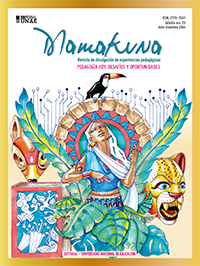Educational digital narratives. Harry Potter: a case study
DOI:
https://doi.org/10.70141/mamakuna.23.1009Keywords:
narratives, digital media, educational digital narratives, connected learning, Harry PotterAbstract
This study defines the term educational digital narratives based on theoretical concepts such as fictional narratives (Ryan, 2020), new information and communication media (Cabrera, 2022) and the proposal of connected learning (Esteban-Guitart et al., 2020). It also examines whether digital content with a focus closer to fiction has educational value, using the Harry Potter saga as a case study. The results show that fictional narratives generate educational processes such as the formation of digital communities and activism. These findings suggest that fictional narratives promote creative educational processes and that new media facilitate learning by enabling the construction of digital communities. At the same time, key aspects of networked learning are explored for the creation of educational digital narratives, focusing on representation and affinity to generate meaningful educational processes.
Downloads
References
Baig Falgueras, M., Boned Ribas, P., González-Ceballos, I. y Esteban-Guitart, M. (2023). Artefactos identitarios multimodales 2.0 como mecanismo de personalización del aprendizaje en educación superior. Un estudio cualitativo. RIED-Revista Iberoamericana de Educación a Distancia, 26(2), 27-44. https://doi.org/10.5944/ried.26.2.36227
Cabrera, D. (2021). El algoritmo como imaginario social. Zer, 26(50), 125-145. https://doi.org/10.1387/zer.22206
Cabrera, D. (2022). Tecnología como ensoñación. Ensayos sobre el imaginario tecnocomunicación. Ediciones Universidad de la Frontera.
Carriere, K. (2018). “We Are Book Eight”: Dialoging the collective imagination through literary fan activism. Culture & Psychology, 24(4), 529-544. https://doi.org/10.1177/1354067X18796805
Cody Pfister, R. y Martin, C. (2019 ). Affinity bonding through shared cultures and practices. En M. Ito, C. Martin, R. Cody Pfister, M. Rafalow, K. Salen y A. Wortman (Eds.), Affinity Online: How Connection and Shared Interest Fuel Learning (pp. 39-68). Irvine.
Ganzert, A. (2021). Dumbledore’s army, still recruiting: fan & media activism as practice. En E. Bippus, A. Ganzert y I. Otto (Eds.), Taking sides: theories, practices, and cultures of participation in dissent (pp. 109-120). Bielefeld. https://doi.org/10.1515/9783839449011-009
García-Roca. (2023). Lecturas y lectores digitales en comunidades virtuales de escritura creativa. Revista de Literatura Infantil y Juvenil Contemporánea, (17), 22-34. https://doi.org/10.48102/lijibero.16.351
Hinck, A. (2019). Politics for the love of Fandom. Fan based citinzeship in digital world. Louisiana State University Press Baton Rouge.
Ito, M., Arum, R., Conely, D., Gutiérrez, K., Kirschner, B., Livingstone, S., Michalchik, V., Penuel, W., Peppler, K., Pinkard, N., Rhodes. J., Salen Tekinbaş, K., Schor, J., Sefton-Green, J. y Watkins, C. (2020). The connected learning research network: reflections on a decade of engaged scholarship. Connected Learning Alliance. https://clalliance.org/publications/the-connected-learning-research-network-reflections-on-a-decade-of-engaged-scholarship/
Ito, M., Soep, E., Kligler-Vilenchik, N., Shresthova, S., Gamber-Thompson, L. y Zimmerman, A. (2020). Learning connected civics: narratives, practices, infrastructures. Cultural Production and Participatory Politics. https://doi.org/10.1080/03626784.2014.995063
Jenkins, H. (2012). “Cultural Acupuncture”: fan activism and the Harry Potter Alliance. En L. Geraghty (Ed.), Popular media cultures. Palgrave Macmillan. https://doi.org/10.1057/9781137350374_11
Rowling, J. K. (2003). Harry Potter y la Orden del Fénix. Salamandra.
Ryan, M. (2020). Fact, fiction and media. En F. Jannidis, G. Lauer, M. Martínez y S. Winko, Narrative Factuality (pp. 75-93). Walter de Gruyter. https://doi.org/10.1515/9783110486278-004
Tabernero Sala, R. y Nogués Bruno, M. (2022). Entre papeles y pantallas. Lecturas no ficcionales de libros ilustrados de ficción. Revista Colombiana de Educación, (89), 298-319. https://doi.org/10.17227/rce.num89-17429
Trinidad Delgado, L. y Libertad Ampudia, P. (2021). Redes sociales: refugio u hostilidad en la contingencia. TRAMAS. Subjetividad y procesos sociales, 56, 341-361. https://tramas.xoc.uam.mx/index.php/tramas/article/view/954/943
Published
How to Cite
Issue
Section
License
Copyright (c) 2024 Universidad Nacional de Educación

This work is licensed under a Creative Commons Attribution-NonCommercial-ShareAlike 4.0 International License.





